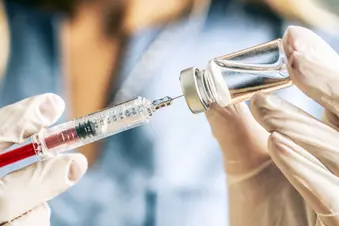
When you’re diagnosed with early breast cancer, treatment may involve your immune system, using it to either shrink the tumor before surgery or to try to keep the cancer from coming back after surgery.
Researchers are working to make immune therapy more effective against breast cancer, both by coming up with new kinds of treatment and by identifying which treatment is best for each person. When they find something promising in the lab, they test it in people through clinical trials.
A number of clinical trials are looking at vaccines as a breast cancer treatment option and at biomarkers as a way to guide treatment decisions.
Vaccines for Breast Cancer
You probably think of a vaccine as a way to prevent disease, but they’re used in treatment, too. A vaccine can teach your body’s immune system to see a cancer cell as an invader and attack it like it would a germ.
A benefit of vaccines over chemotherapy or radiation is that they can be made to work only on the tumor without damaging healthy cells. But tumor cells – breast cancer in particular – have proven to have a strong ability to outsmart your immune system. So far, none of the vaccines tested to treat breast cancer have had much success. New studies are using several strategies to try to change that.
Different targets. Vaccines use a particle called an antigen that’s found on a cancer cell. They tell your immune system that it’s dangerous and to destroy any cells that have that antigen. Some vaccines use antigens that are also found on healthy cells. They can have a hard time making enough of an immune response to fight the cancer without going overboard and harming healthy tissue.
Cancer cells have thousands of antigens that can be potential vaccine targets. New research is working with antigens that only appear on tumor cells, not normal cells.
Different technology. Scientists are coming up with new ways to make and to deliver vaccines. With breast cancer, researchers are experimenting with vaccines made from whole tumor cells, DNA, proteins or protein fragments, and viruses.
Different timing. In earlier studies, vaccines were mainly tested in women with metastatic breast cancer. Now researchers are trying to see if they can get better results if they use vaccines earlier in treatment, or in combination with other kinds of immunotherapy.
Breast Cancer Biomarkers
Not every breast cancer treatment works equally well for every person. That’s because everyone’s body and everyone’s cancer is different. Your doctor can get clues as to how your cancer may behave by looking at what are called biomarkers.
Biomarkers are pieces of information about what’s going on in your body that can be measured. That includes things like your weight and blood pressure, but also the amounts of tiny particles inside your cells. In breast cancer, biomarkers are used to predict which treatment will work best for you.
When you’re diagnosed with breast cancer, tumor cells are sent to a laboratory for testing. The biomarkers doctors look for include:
- Hormone receptor proteins (ER and PR)
- Human epidermal growth factor receptor 2 (HER2)
- Gene mutations
Cancer cells that have a lot of hormone receptors need estrogen and/or progesterone to grow. Hormone therapy can be part of successful treatment. Tumors with a lot of HER2 tend to grow and spread quickly. But there are a number of drugs that kill cancer cells by targeting this protein. And certain changes to the genes inside tumor cells can make them more likely to respond to immunotherapy.
Biomarkers play a role in breast cancer research in several different ways.
Testing. Some researchers are looking at ways to more quickly and accurately test tumor samples for hormone receptors and HER2 using new technology.
Others are focused on detection. Several clinical trials are trying to find out whether a blood test can be used to find out if you have breast cancer by measuring the levels of proteins, antibodies, and other particles released by the cancer cells.
Treatment. A large, ongoing study is looking at different combinations of biomarkers to try to come up with more specific treatment options. Researchers are testing dozens of experimental drugs and drug combinations in people with early breast cancer. They’ve already identified several biomarker profiles that make you a good candidate for a certain drug.
And another large study is looking to find new breast cancer biomarkers by studying the blood, lymph nodes, and breast tissue of thousands of people who have had breast cancer.
How to Participate in a Clinical Trial
You can help doctors learn more about breast cancer and possibly get to try cutting-edge treatment by taking part in a clinical trial. Your doctor may be able to steer you to a trial in your area. They can also tell you if a particular trial is safe for you and might be able to help you. You should always get the OK from your doctor before you change your treatment.
Other ways to find clinical trials include:
- Clinicaltrials.gov is a database run by the U.S. National Library of Medicine. It lists thousands of clinical trials you can search by condition and by location.
- The National Cancer Institute also has a search tool for clinical trials it sponsors or funds.
- You can get guidance about trials that might be right for you and how to figure out the process from advocacy groups like breastcancertrials.org and the Center for Information and Study on Clinical Research Participation.
- Check with a hospital or university in your area. They often list trials seeking volunteers on their websites.
Once you’ve chosen a clinical trial, find out everything you can about it. Whoever is conducting it should be able to give you detailed information, such as:
- What they hope to learn
- What tests or treatment you’ll get
- How long the study will last
- Any risks to you
Studies have different requirements for volunteers. The research team may be looking for people of a certain age or at a certain cancer stage. If you meet the qualifications, here’s what you can expect:
- You’ll be officially enrolled in the study after giving what’s called informed consent. That means the risks and possible benefits will be explained to you and you’ll agree to accept them.
- You’ll give details about your medical history and may have a physical exam and blood or other lab tests.
- You may get the treatment that’s being tested, or you may be in a control group that’s used to compare the results of the new treatment against the results of the standard treatment.
- Costs of the study are usually covered by the study itself or by your health insurance. You may even be paid for your time and travel.
Taking part in a clinical trial is voluntary. You can quit at any time for any reason.
Show Sources
SOURCES:
Photo Credit: SimpleImages / Getty Images
American Cancer Society: “Treatment of Breast Cancer Stages I-III,” “Other Breast Cancer Gene, Protein, and Blood Tests,” “Hormone Therapy for Breast Cancer,” “Breast Cancer HER2 Status,” “Being in a Clinical Trial.”
Susan G. Komen: “Early Breast Cancer Treatment,” “Tumor Characteristics.”
Breast Cancer Research Foundation: “Breast Cancer Vaccines Explained,” “BCRF’s Guide to Breast Cancer Clinical Trials.”
European Journal of Cancer: “Therapeutic vaccines for breast cancer: Has the time finally come?”
Frontiers in Endocrinology: “Breast Cancer Vaccines: New Insights.”
American Society of Clinical Oncology: “What are Cancer Vaccines?”
Journal of Hematology & Oncology: “Cancer vaccines as promising immuno-therapeutics: platforms and current progress.”
Current Opinion in HIV and AIDS: “What are Biomarkers?”
Johns Hopkins Medicine: “Testing for Breast Cancer.”
American Journal of Cancer Research: “Immunotherapy and immunobiomarker in breast cancer: current practice and future perspectives.”
Communications Medicine: “Determining breast cancer biomarker status and associated morphological features using deep learning.”
Frontiers in Molecular Biosciences: “Breast Cancer; Discovery of Novel Diagnostic Biomarkers, Drug Resistance, and Therapeutic Implications.”
Cancer Cell: “Redefining breast cancer subtypes to guide treatment prioritization and maximize response: Predictive biomarkers across 10 cancer therapies.”
Clinicaltrials.gov.
National Cancer Institute: “Steps to Find a Clinical Trial,” “Find NCI-Supported Clinical Trials,” “What Are Clinical Trials?” “Randomization and Bias in Cancer Clinical Trials,” “Insurance Coverage and Clinical Trials.”
Breastcancertrials.org.
Center for Information and Study on Clinical Research: “Find a Trial.”
